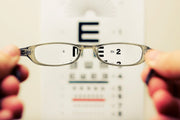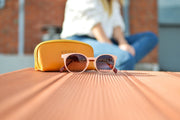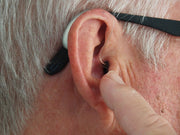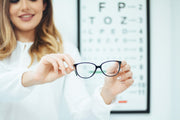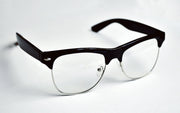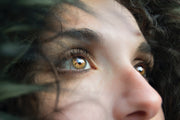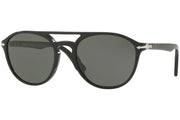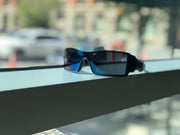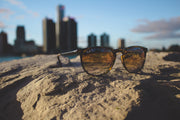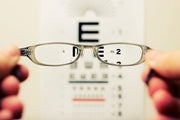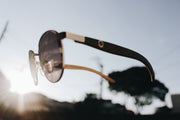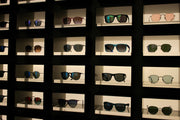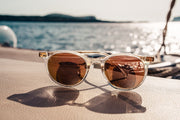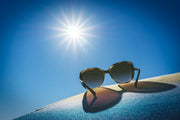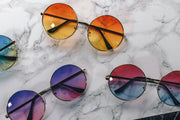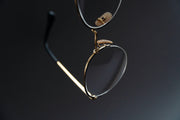Protecting your eyes from the sun's harmful UV rays is crucial to maintaining good eye health. But the question is: when to wear sunglasses? Is it only necessary during sunny days, or do other times call for maximum sun protection?
In this quick guide, we'll explore the different situations where you need to wear sunglasses and what features to look for in a pair of shades that will provide optimal protection. Whether you're hitting the beach or running errands on a bright day, knowing when and how to wear sunglasses can make all the difference in keeping your eyes healthy.
When To Wear Sunglasses For Maximum Protection
Remember to wear sunglasses when the sun is at its highest, and the most damaging rays are strongest between 10 am-2 pm. Put on a pair of sunglasses when you step outside into the bright light of day. It is important for driving (since car windows don't always shield you from UV rays) and outdoor activities like exercising, gardening, and picnicking.
Young people must protect their eyes from the sun. Studies have shown that UV light has a greater impact on eye health from early life until your 20s. Children's lenses are clearer than adults', allowing those harmful rays to penetrate deeper into their eyes. Plus, kids tend to spend more time outside than grown-ups, so they're exposed even more frequently to damaging UV radiation.
Why It's Important to Wear Sunglasses
Sun Protection For All Types of Activities
Sunglasses are no longer reserved for sunny days spent outdoors in spring and summer. Incorporating sunglasses into your year-round activities is important, especially while driving.
Believe it or not, a car's windshield doesn't offer much protection from harmful UVA rays and distracting glare. So next time you hit the road, wear sunglasses for added safety and comfort.
But that's not all – sunglasses should always be part of your outdoor gear, whether running, swimming, or hiking throughout the year. No matter your age or what season it is outside, wearing sunglasses is essential to protect your eyes from damaging UV rays while enjoying the great outdoors.
Reduce Your Exposure to Allergens and Irritants
Sunglasses are an essential accessory to protect your eyes from harmful UV rays. However, they do more than that - they also shield against other irritants and elements that can affect your vision.
For instance, have you ever noticed chefs wearing sunglasses while chopping onions? This is because the lenses provide a barrier against Propanethiol S-oxide emitted during the cutting process. When exposed to this chemical compound causes tears in our eyes, resulting in an unpleasant cooking experience.
Similarly, sunglasses guard your eyes against year-round factors such as allergens, wind, and debris. They keep these pesky particles at bay so you can enjoy clear vision without discomfort or irritation.
Whether it's spring allergies or dry winter weather causing problems for your peepers, always keep those trusty shades nearby to ensure maximum comfort and clarity for your eyes.
Help Minimize Exposure To Sunlight-related Eye Diseases
Did you know that wearing a top-quality pair of sunglasses can reduce your chances of developing certain eye conditions caused by UV rays? It's true! Diseases like cataracts, macular degeneration, pinguecula, and pterygium can all be prevented with the proper eyewear.
Cataracts are especially concerning since they're the world's leading cause of blindness, according to the World Health Organization. Many cases are believed to be worsened by exposure to UVB rays. Similarly, macular degeneration and pinguecula or pterygium (which cause yellowish bumps on the whites of your eyes) also result from unprotected sun exposure.
To keep your eyes and surrounding skin safe when you're outside enjoying sunny weather, consider getting wraparound sunglasses or ones with side panels for added coverage. And if you already wear prescription glasses or contacts regularly, remember to schedule regular eye exams - this ensures that you're always using protective eyewear that works best for your needs every season!
Avoid Getting Photokeratitis by Staying Safe
Photokeratitis, also known as corneal sunburn, is a condition that can cause several unpleasant symptoms. You may experience discomfort and blurred vision accompanied by heightened sensitivity to light. In more severe cases, temporary vision loss - commonly called "snow blindness" - can occur. While the good news is that this condition is only temporary, it's not something you want to experience.
The easiest way to protect yourself from photokeratitis is to wear sunglasses when you're in bright sunlight. Not only will they shield your eyes from harmful UV rays, but they'll help prevent other eye-related issues too. So next time you head out in the sunshine, ensure you have a pair of stylish shades!







